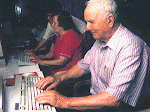"This is simply unprecedented in modern medicine," San Francisco based pediatric neurologist Mort Fishman explained. "Typically when a new disease is discovered, it is described by its symptomatology or associated laboratory abnormalities. Or the researchers who first discovered or popularized the condition give it a name. Sometimes it catches on, and sometimes a more grassroots name evolves over time. Who would Disney even buy it from?"
Disney, a company associated more with theme parks and major motion pictures than medical discoveries, played no role whatsoever in research on the new disease. Neurologists caring for these children, who have been stricken suddenly with severe weakness and even total paralysis of one or more extremities, some even suffering loss of the ability to breathe on their own, have described the condition as polio-like because of its similarity with the once prevalent vaccine preventable infection. Although these children have not been infected with the polio virus, researchers do suspect that a different viral pathogen is to blame.
Media analyst Harb Billingsly, who has written extensively on Disney over the past four decades, sees this move as an advertising paradigm shift. "If this disease becomes a pandemic, Disney has an advertising bonanza. It will be in medical charts all over the world. People will literally be screaming Disney's name. As they say in the business, no publicity is bad publicity!"
Billingsly revealed that there are other potential uses for the disease in addition to breaking new ground in advertising:
"Disney has sunk a lot of money into their Avengers franchise with great reward, and now they own the Star Wars name. This mystery illness might be worked into the plot of an upcoming movie. Maybe the Avengers need to find a cure, or a young Jedi becomes paralyzed and must develop his powers in an interesting new way. The sky is the limit."Disney has yet to make any announcements regarding the name chosen for the disease.

No comments:
Post a Comment